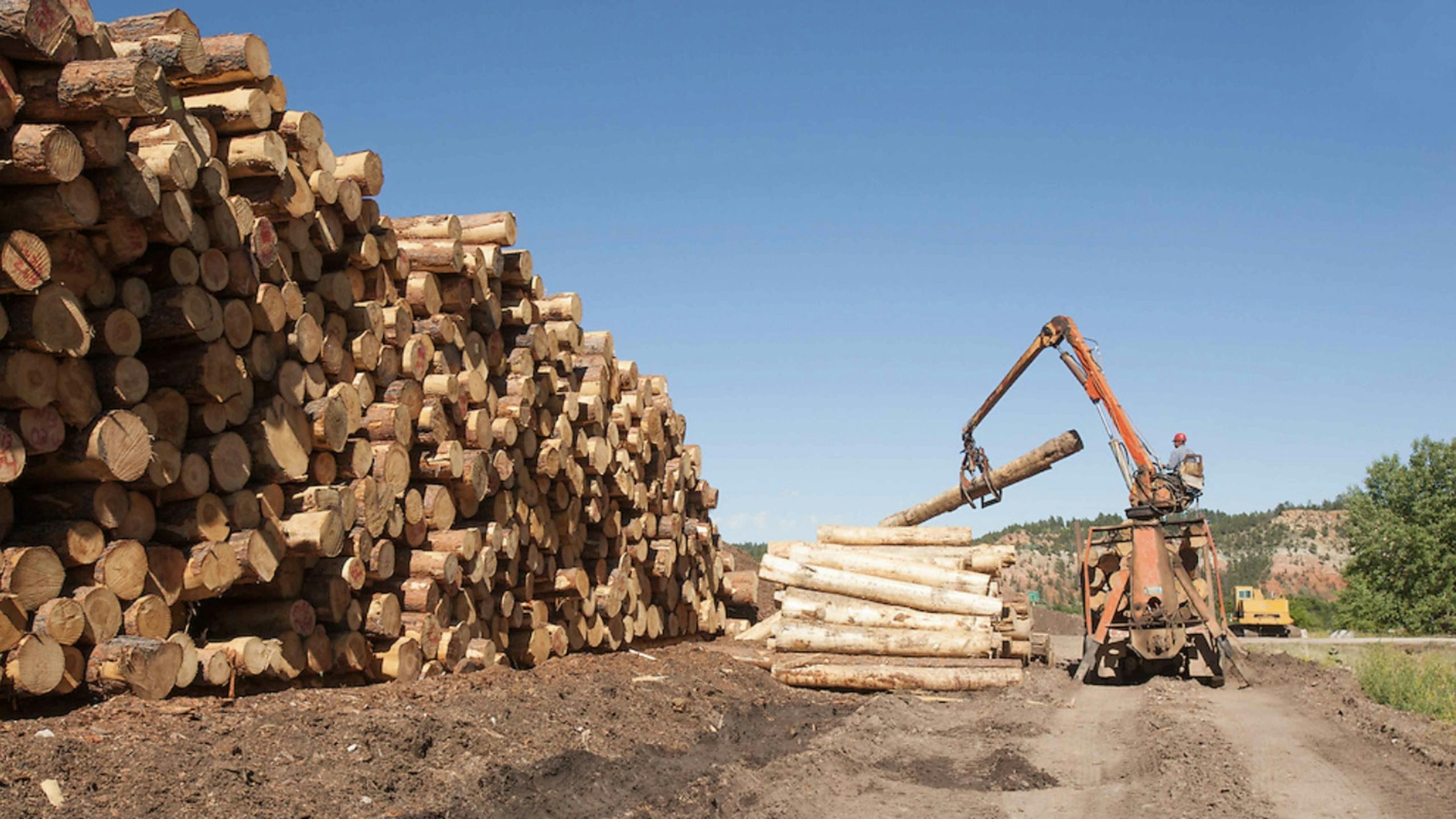The impacts of a decision to reduce timber sales in the Black Hills National Forest will go far beyond the region’s economy, according to a state senator and a timber resource advocate.
The limited timber sales — and the resulting reduced hours at two Black Hills area sawmills — will have environmental impacts on the Ponderosa Pine forests as well.
With reduced forest management, one of the nation’s best managed forests won’t just see an increase in frequency of beetle infestations, but an increase in severity of wildfires as well, said Ben Wudtke, executive director of the Black Hills Forest Resource Association.
“We’ve had tremendous success with reducing mountain pine beetle mortality and making forested stands resistant and resilient to wildfire impacts all through the timber harvest program that’s been on this forest for over 100 years,” he said. “With these reductions in sawmill capacity, these reductions in the capacity for timber harvest, those really equate to reductions in our capacity to care for the forest.”
For Senator Ogden Driskill (R – Devils Tower), there’s a certain pride in how well, and how long, the BHNF has been managed.
“Black Hills National Forest was the first timber sale in the United States, ever. It’s been extremely well managed for 140 to 150 years and the evidence of that is it’s a green forest,” said Driskill.
Along with that pride comes frustration with the decision by the U.S. Forest Service to reduce timber sales.
“Directly From Biden”
According to Driskill, not only is the decision wrong but it was “unbelievably biased.”
“I’ve just come out of two meetings on the forest plan revision … and it is very clear, looking at the way the plan was written, that this comes directly from the (President Joe) Biden administration and is a direct attack on the West,” said Driskill. “It’s not just sawmills, they’re going to come after everything. I’ve never seen anything like it. The term ‘the War on the West’ came through the time I was growing up and it never really came to fruit, but it’s here now.”
According to Wudtke, Ponderosa Pine forests, like the ones in BHNF, have a disturbance-driven ecosystem. While disturbances used to occur naturally, human involvement has changed how these disturbances take place.
“We’ve meddled with those disturbance processes and the forests aren’t in the same natural condition they were 150 years ago and are much more dense,” said Wudtke. “Because of that increased density, those natural disturbances such as pine beetles and wildfires are at a larger scale and higher severity than they were naturally, which puts additional values at risk. Not only ecologically but for our communities as well.”
Disturbances can be introduced into the forest through a scientific process, said Wudtke, and one of those processes is logging. Reduction of those activities will leave the BHNF vulnerable, especially if the limit of timber sales goes for an extended period of time.
Will Last Longer
While letters to the USFS from the Wyoming and South Dakota delegations indicated the reduction might be in place for three years, Wudtke said it could last much longer.
“They’ve outlined the reductions on a three-year term here but conversations with forest products companies and the direction that they’re portraying in their plan revision process that’s underway right now indicates that those reductions are much longer term, on the order of decades,” he said.
“If the Forest Service continues with their planned reductions, we will absolutely be increasing our fire hazard and risk of future pine beetle infestations every year. It won’t take very long before the Black Hills is another headline or in the evening news about a stand replacing fire or a community disaster.”
While much of the West has found itself ablaze with forest fires year after year, the Black Hills has fared better due to its management. One example of this cited by Wudtke was the Wabash Spring Fire near Custer, South Dakota, in April of this year.
“It burned through a stand that had been harvested and that fuel had been reduced, removed from the forest, and they were able to get a controlled fire at 110 acres and the stand still looks beautiful,” he said. “Those are the opportunities that we’re gonna be missing.
Neiman Enterprises
An integral part in the management of that forest has been Neiman Enterprises, which operated three sawmills in the Black Hills area.
Last year, due to the reduction in timber sales, Neiman Enterprises closed its sawmill in Hill City, South Dakota. Last week, the company announced a reduction in hours at its remaining two mills in Hulett and Spearfish, which will take effect in August.
“Reduction with the Black Hills National Forest timber program has required us to temporarily remove a shift in Hulett and limit production in Spearfish,” Sonja Merryman, community relations and marketing manager for Neiman Enterprises, said in an email to Cowboy State Daily. “This curtailment is to match the current and anticipated timber volume.”
While one shift will be removed at the Hulett facility, Merryman said the employees affected will remain on payroll, although their hours will be reduced.
“Our employees are critical to our organization, communities and a critical piece of the health of this forest,” said Merryman. “We are adapting jobs and looking tino additional opportunities.”
Beat Beetle Epidemic
The same pride Driskill has in the long-term management of the BHNF appears to extend to Neiman Enterprises and its role in his district.
“The reason we got ahead of this (beetle) epidemic in the Black Hills was all three of those mills … ran right as hard as they could to harvest dead and dying bug trees, which allowed us to open that canopy up and get control of the bugs,” said Driskill. “Consequently, we still have a green forest.”
Further highlighting the importance of the timber industry to forest management, Driskill drew a direct connection between shuttered sawmills and diseased forests.
“As the sawmills closed and forest management dropped timber density, increased and bugs and disease and fire came in,” said Driskill. “Now, we spend more budget in the Forest Service fighting fires than we do managing timber. That’s a travesty.”
For two days, Driskill sat in meetings with representatives from Wyoming and South Dakota going over the proposed forest assessment for BHNF. The plan is flawed and “unbelievably biased,” he said, and is based on outdated information.
“It really is an unbelievably, poorly written document. It was written by someone that has not been in the hills and has cited lots of data that was old, lots of places they didn’t cite anything and a lot of places they did pre-decisional determinations that has nothing to do with an assessment,” said Driskill. “I feel like we’re on a railroad train for disaster in the Hills.”
Economic Impact
While the ecological impacts cannot be overstated, it seems, the economic impact is still one to consider.
“The hits are incredible as sawmills are a lot like ranches. Virtually everything they do supports the industries that go with them. When you pull a shift off, that affects the part store in Sundance. The money just spreads everywhere locally. They’re a huge local business,” said Driskill.
“The first hit, obviously, is the people and their wages and that’s extremely important but it also supports all kinds of other jobs,” he continued. “When the mill’s not running, you’re not breaking things down and the amount of money they spend on maintenance and upkeep and equipment replacement is phenomenal.”
The impact will go beyond the normal, day-to-day wear and tear on equipment, said Driskill. According to the senator, the impact may also be felt in the electric bills of people in his district because of the co-operative setup of the Powder River Energy Corporation.
“I believe, outside of the coal mines, they’re one of PRE-Corp’s (Powder River Energy Corporation) largest customers and when you shut everything off for a shift, you’re not using any electricity and that trickles on down,” said Driskill. “We’re a co-op and they help pay everybody’s bills.”
Fighting Back
Wudtke said the economic impact, especially to a community like Hulett, population 309, cannot be ignored if the limited production at the sawmill continues.
“As an industry, we’re really here for the forest,” said Wudtke. “Neiman Timber, among other companies, are multi-generational family businesses and caring for the forest is our first priority.”
Driskill, meanwhile, encourages public involvement in the current revision to the forest plan for the BHNF.
“If the public does not step up and strongly voice their opinion, you can be assured we’re going to get a Democratic, Biden Administration, eastern attitude on how we manage our forests,” he said.
“It sounds wonderful to make more trees grow and to get bigger trees and let’s make for better habitat,” he continued. “That really sounds good right up ‘til the day the bugs come through or the forest fire comes and does that massive release of carbons.”
And for Driskill, it’s hard not to take the timber sale reduction personally.
“They’re truly messing with the entire livelihood of everybody that lives in my district.”





